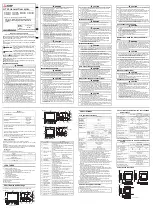
XLINK 500/100 Operations & Maintenance Manual page # 99
It is not possible to entirely disable logging of measurement results. However, one can set the
logging interval as slow as once a day.
9.7.2.
Log Error Value
When the system cannot get valid data from a sensor (more specifically, when a sensor failure
error occurs), the system will change the sensor reading to match the user-set
Log Error Value,
which defaults to -99999. Such atypical numbers are used to attract t
he user’s attention when
viewing the log.
9.8.
Transmission Data Content Settings
9.8.1.
Tx Data Content
Tx Data Content
indicates which readings to include in the transmission. Each measurement has
multiple
Tx Data Content
settings: one for each transmission.
The options are All Logged, Individual, Last, and Exclude.
By selecting
All Logged
, measurements that are logged according to the measurement
schedule are transmitted. Only readings made since the last transmission are included.
This setting is dependent on the
Logging Interval
setting.
Please note that if the system is logging data more frequently due to being in
alarms, the extra data is NOT transmitted. To include extra data created by alarms,
please use the
Last
option.
The only data points transmitted are those made according to the measurement
time and logging interval settings.
See below for the
Individual
setting.
Last
means to transmit a set number of the most recent readings (determined by
Number of Values to Tx
).
Use
Last
for alarm and random transmissions to ensure that the value that caused
alarms is transmitted!
Last
is the only option that may be used to transmit data that is not collected based
upon the measurement schedule.
By selecting
Exclude
, no readings of this measurement are transmitted.
All Since Last Tx
includes all logged data since the last transmission.
All Since Last Tx
selection is different from
All Logged
in that it ignores measurement scheduling.
All
Since Last Tx
will parse through the log and include every logged entry of the
measurement.
This option is useful when the logging interval changes due to alarms or scripts.
This option results in a variable amount of data in the transmission. Only certain
Tx
Format
options are suitable for
All Since Last Tx
. Timestamps of transmitted data
using SHEF, some Pseudobinary, and all formats that do not give each reading its
own timestamp, may be incorrect. CSV and MIS will work correctly. Pseudobinary B
is not suitable.
With
All Since Last Tx
, all estimates of data content may be incorrect.
With
All Since Last Tx
, newest data in transmission may be at (transmission time -
Sensor Encoding Time
). Oldest data will be newer than (last transmission time
–
Sensor Encoding Time
).
Skip First Missing
does not work with
All Since Last Tx
.
















































